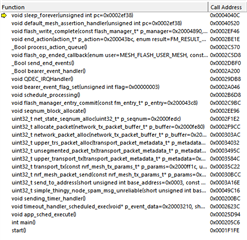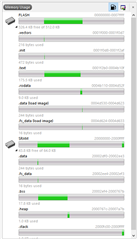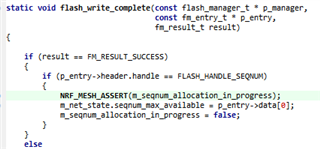Hi all,
I'm currently implementing a Bluetooth Mesh system for testing various network characteristics.
I am running some tests were a Nordic Thingy:52 is sending a lot of messages. Unfortunately, after sending 8126 messages, my sending node crashes with the following:
<t: 7526098>, nrf_mesh_node_config.c, 118, MESH ASSERT at 0x0002EF38
This is always the case, even with different delays between sending (I've tested sending every 25, 50 and 100ms).
Some additional information:
-I am using Mesh SDK version 1.0.1.
-This is the call stack;

- Memory usage

- The actual function that causes the assert (which was always there)

I have absolutely no clue what is going wrong and I hope someone can help me. I am pretty new to Mesh and the SDK since i'm a student.
If any additional info is helpful please let me know.
Jan


